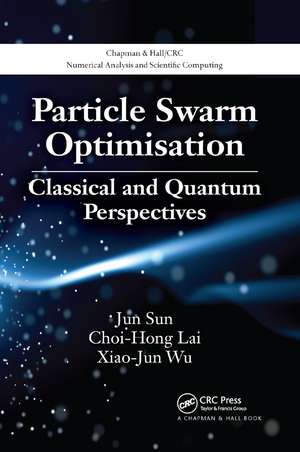Particle Swarm Optimisation: Classical and Quantum Perspectives: Chapman & Hall/CRC Numerical Analysis and Scientific Computing Series
Autor Jun Sun, Choi-Hong Lai, Xiao-Jun Wuen Limba Engleză Paperback – 19 sep 2019
The book presents the concepts of optimisation problems as well as random search methods for optimisation before discussing the principles of the PSO algorithm. Examples illustrate how the PSO algorithm solves optimisation problems. The authors also analyse the reasons behind the shortcomings of the PSO algorithm.
Moving on to the QPSO algorithm, the authors give a thorough overview of the literature on QPSO, describe the fundamental model for the QPSO algorithm, and explore applications of the algorithm to solve typical optimisation problems. They also discuss some advanced theoretical topics, including the behaviour of individual particles, global convergence, computational complexity, convergence rate, and parameter selection. The text closes with coverage of several real-world applications, including inverse problems, optimal design of digital filters, economic dispatch problems, biological multiple sequence alignment, and image processing. MATLAB®, Fortran, and C++ source codes for the main algorithms are provided on an accompanying downloadable resources.
Helping you numerically solve optimisation problems, this book focuses on the fundamental principles and applications of PSO and QPSO algorithms. It not only explains how to use the algorithms, but also covers advanced topics that establish the groundwork for understanding.
Din seria Chapman & Hall/CRC Numerical Analysis and Scientific Computing Series
- 12%
 Preț: 312.43 lei
Preț: 312.43 lei - 20%
 Preț: 388.56 lei
Preț: 388.56 lei - 32%
 Preț: 414.02 lei
Preț: 414.02 lei - 31%
 Preț: 360.93 lei
Preț: 360.93 lei - 33%
 Preț: 408.36 lei
Preț: 408.36 lei - 31%
 Preț: 265.29 lei
Preț: 265.29 lei - 20%
 Preț: 572.75 lei
Preț: 572.75 lei - 31%
 Preț: 435.86 lei
Preț: 435.86 lei - 33%
 Preț: 408.36 lei
Preț: 408.36 lei - 20%
 Preț: 207.52 lei
Preț: 207.52 lei - 20%
 Preț: 488.46 lei
Preț: 488.46 lei - 31%
 Preț: 341.93 lei
Preț: 341.93 lei - 12%
 Preț: 315.00 lei
Preț: 315.00 lei - 20%
 Preț: 399.88 lei
Preț: 399.88 lei - 30%
 Preț: 259.81 lei
Preț: 259.81 lei - 20%
 Preț: 373.53 lei
Preț: 373.53 lei - 20%
 Preț: 1162.75 lei
Preț: 1162.75 lei - 20%
 Preț: 829.62 lei
Preț: 829.62 lei - 20%
 Preț: 1065.07 lei
Preț: 1065.07 lei - 30%
 Preț: 331.49 lei
Preț: 331.49 lei - 29%
 Preț: 273.60 lei
Preț: 273.60 lei - 15%
 Preț: 714.22 lei
Preț: 714.22 lei - 15%
 Preț: 739.90 lei
Preț: 739.90 lei - 11%
 Preț: 355.99 lei
Preț: 355.99 lei - 31%
 Preț: 537.50 lei
Preț: 537.50 lei - 28%
 Preț: 879.65 lei
Preț: 879.65 lei
Preț: 493.07 lei
Preț vechi: 616.34 lei
-20% Nou
Puncte Express: 740
Preț estimativ în valută:
94.35€ • 98.51$ • 78.09£
94.35€ • 98.51$ • 78.09£
Carte tipărită la comandă
Livrare economică 04-18 aprilie
Preluare comenzi: 021 569.72.76
Specificații
ISBN-13: 9780367381936
ISBN-10: 0367381931
Pagini: 419
Dimensiuni: 156 x 234 x 20 mm
Greutate: 0.45 kg
Ediția:1
Editura: CRC Press
Colecția CRC Press
Seria Chapman & Hall/CRC Numerical Analysis and Scientific Computing Series
ISBN-10: 0367381931
Pagini: 419
Dimensiuni: 156 x 234 x 20 mm
Greutate: 0.45 kg
Ediția:1
Editura: CRC Press
Colecția CRC Press
Seria Chapman & Hall/CRC Numerical Analysis and Scientific Computing Series
Public țintă
Academic and Professional Practice & DevelopmentCuprins
Introduction. Particle Swarm Optimisation. Some Variants of Particle Swarm Optimisation. Quantum-Behaved Particle Swarm Optimisation. Advanced Topics. Industrial Applications. Index.
Notă biografică
Jun Sun is an associate professor in the Department of Computer Science and Technology at Jiangnan University. He is also a researcher at the Key Laboratory of Advanced Process Control for Light Industry in China. He has a Ph.D. in control theory and control engineering. His research interests include computational intelligence, numerical optimisation, and machine learning.
Choi-Hong Lai is a professor of numerical mathematics in the Department of Mathematical Sciences at the University of Greenwich. He has a Ph.D. in computational aerodynamics and PDEs. His research interests include numerical PDEs, numerical algorithms, and parallel algorithms for industrial applications, such as aeroacoustics, inverse problems, computational finance, and image processing.
Xiao-Jun Wu is a professor at Jiangnan University. He has a Ph.D. in pattern recognition and intelligent systems. He has published more than 150 papers on pattern recognition, computer vision, fuzzy systems, neural networks, and intelligent systems.
Choi-Hong Lai is a professor of numerical mathematics in the Department of Mathematical Sciences at the University of Greenwich. He has a Ph.D. in computational aerodynamics and PDEs. His research interests include numerical PDEs, numerical algorithms, and parallel algorithms for industrial applications, such as aeroacoustics, inverse problems, computational finance, and image processing.
Xiao-Jun Wu is a professor at Jiangnan University. He has a Ph.D. in pattern recognition and intelligent systems. He has published more than 150 papers on pattern recognition, computer vision, fuzzy systems, neural networks, and intelligent systems.
Descriere
Helping readers numerically solve optimization problems, this book focuses on the fundamental principles and applications of PSO and QPSO algorithms. The authors develop their novel QPSO algorithm, a PSO variant motivated from quantum mechanics, and show how to implement it in real-world applications, including inverse problems, digital filter d
